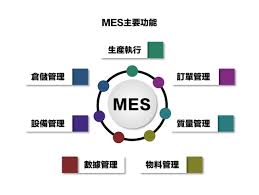
Manufacturing execution systems (MES) are computerized systems used in manufacturing, to track and document the transformation of raw materials to finished goods. MES provides information that helps manufacturing decision makers understand how current conditions on the plant floor can be optimized to improve production output.[ MES works in real time to enable the control of multiple elements of the production process (e.g. inputs, personnel, machines and support services).
MES may operate across multiple function areas, for example: management of product definitions across the product life-cycle, resource scheduling, order execution and dispatch, production analysis and downtime management for overall equipment effectiveness (OEE), product quality, or materials track and trace. MES creates the “as-built” record, capturing the data, processes and outcomes of the manufacturing process. This can be especially important in regulated industries, such as food and beverage or pharmaceutical, where documentation and proof of processes, events and actions may be required.
The idea of MES might be seen as an intermediate step between, on the one hand, an enterprise resource planning (ERP) system, and a supervisory control and data acquisition (SCADA) or process control system on the other; although historically, exact boundaries have fluctuated. Industry groups such as MESA International—Manufacturing Enterprise Solutions Association were created in the early 1990s in order to address the complexity, and advise on execution, of MES Systems.
“Manufacturing Execution Systems [help] create flawless manufacturing processes and provide real-time feedback of requirement changes”,[ and provide information at a single source. Other benefits from successful MES implementation might include:
- Reduced waste, re-work and scrap, including quicker setup times
- More accurate capture of cost-information (e.g. labor, scrap, downtime, and tooling)
- Increased uptime
- Incorporate paperless workflow activities
- Manufacturing operations traceability
- Decreases downtime and easy fault finding
- Reduced inventory, through the eradication of just-in-case inventory

Like!! Thank you for publishing this awesome article.